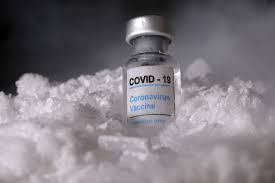The African continent needs 800 million doses of the Covid-19 vaccine and is scouting for pharmaceutical manufacturers that would provide the best financing deal while factoring in safety and efficacy for Africans.
Africa has a population of 1.3 billion and at the very least, 60 percent of Africans, about 800 million, have to be vaccinated to achieve levels of herd immunity that would protect against the coronavirus.
This means about 800 million single doses are needed and if the vaccine has double doses, 1.5 billion doses are required.
According to the Africa Centres for Disease and Control Prevention (CDC), about US$15 billion is needed to purchase the vaccines.
Another US$10 billion to US$15 billion would be required to transport, deliver vaccines across the continent, provide medical consumables, documentation and monitoring of people who have been vaccinated.
Africa CDC Deputy Director of Dr Ahmed Ogwell Ouma said there were many countries involved in making Covid-19 vaccines and all were being consulted.
“There are many countries involved such as China, Cuba, South Korea, India and we are in consultation. We may end up with 10 vaccines beyond the first quarter and our vaccine source will be the one who provides the best deal and our basis being safety and efficacy,” he said responding to media questions.
Dr Ogwell said there were 10 possible sources of the vaccine in Africa and one was through the COVAX global Covid-19 distribution scheme that was gathering momentum.
“Right now we have three vaccines that have passed through the regulation process and have emergency use authorisation. We have seven other vaccines that are at an advanced stage of clinical trials Stage Three. Before the end of this quarter we may have 10 different vaccines having emergency use approval, so it means the choices will be there,” said the expert.
“So a vaccine source will depend on one who is giving us the best deal as far as safety and efficiency is concerned. We are looking at close to 100 percent as possible and who is giving the deal a good amount of purchase and who is going to deliver in the fastest way.”
Although Africa CDC has not yet picked a vaccine for all the countries in the continent, Dr Ogwell revealed Africa CDC had already concluded negotiations with at least three companies, which were AstraZeneca (working with the University of Oxford from the UK), Johnson and Johnson (an American medical device company) and Pfizer (another American multinational pharmaceutical corporation).
“Africa is looking for a vaccine that is least complicated to use with normal room temperature, offers single dosage and is relatively easy to deliver from manufacturers to countries where it is needed. If we have this, then we should be able to be ready in the first quarter, if the vaccine is more complex, needing a negative 80 degrees Celsius then that would be a complicated situation to manage. As to how ready the continent is for mass rollout, we will be conducting rapid assessment towards this month for each country,” said Dr Ogwell.
Africa CDC is also insisting that any manufacturer who wants to engage with Africa must have a trial site on the continent to see how the vaccine candidate interacts with the continent.
“There are indicators that will tell us whether a country will be ready or not but most of the countries on the continent are not yet ready precisely because we don’t know which vaccine we are going to be using but in as far as the basic infrastructure is concerned most have that in place. But when vaccination starts, Africa should be able to vaccinate more smoothly. We are used to vaccinating children now we are dealing with adults which is now complex but the basic method of vaccination is the one we have been utilising,” Dr Ogwell said.
The health expert said history must not repeat itself such as when Africa had problems accessing some important products.
“Vaccines do not save lives vaccination saves lives need away of making sure distributed to where they are needed. We are in the Covid-19 era we don’t want to miss out on the vaccines, we want equitable access and that should not be tied to how rich someone is or where someone is across the world,” he said.
“For example, in the mid 90s, in 1996 when some treatment became available for HIV, those who had access in United States, the death rate just plummeted while in Africa between 1996 to 2006, deaths continued. Over a 10 year period, Africa lost 12 million people because the drugs were too expensive as those holding the drug patents didn’t want to bring the cost down.”
Through the COVAX facility, the World Health Organisation has put aside 220 million doses but Dr Ogwell said it would cover barely 10 percent of Africa’s population.
“We need to reach 60 percent and that’s a large gap we need to cover as a continent,” he said.
In Zimbabwe, sources within the medical field said a vaccine roll out for Zimbabwe should start in May and was being coordinated by WHO.

